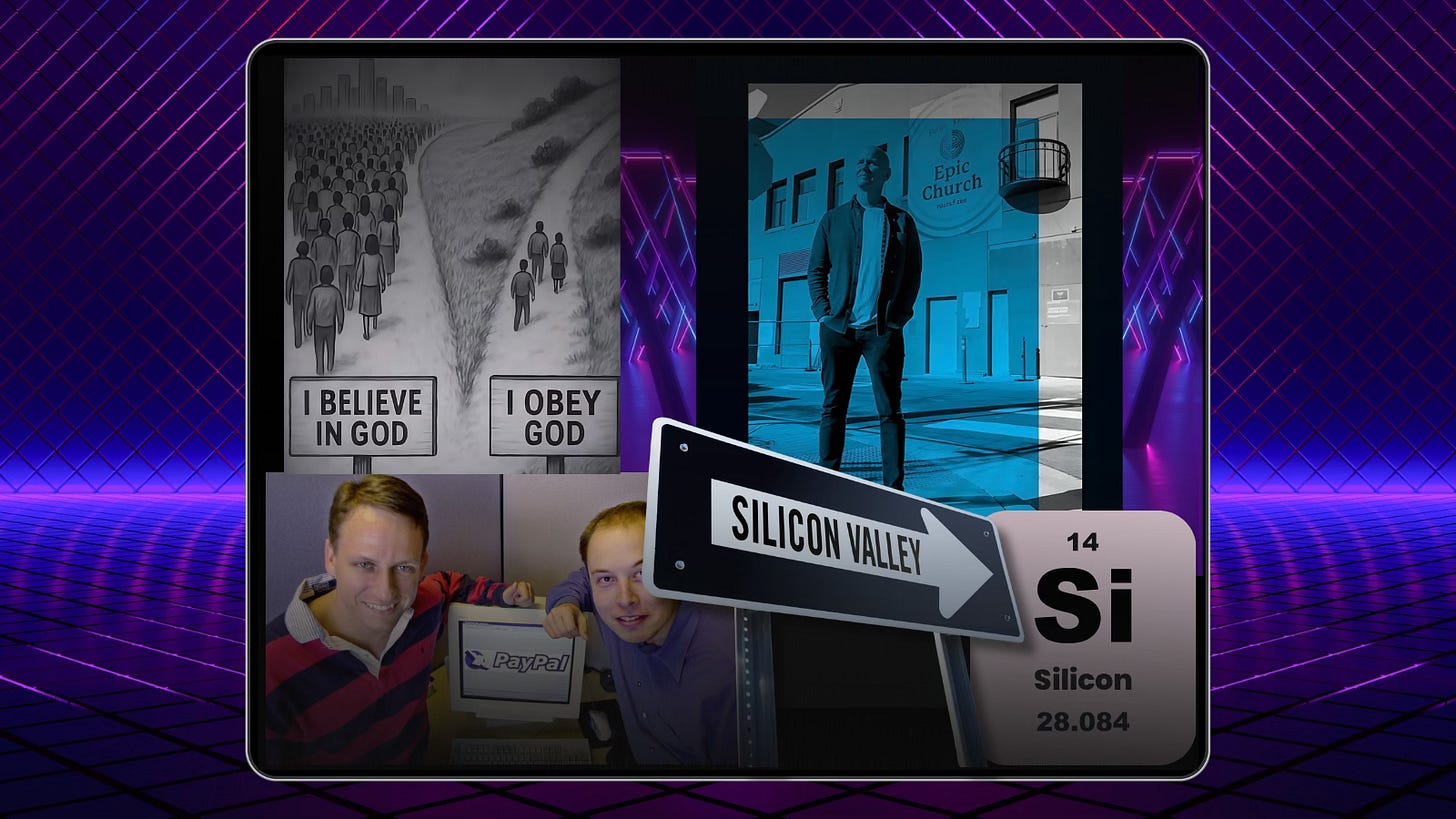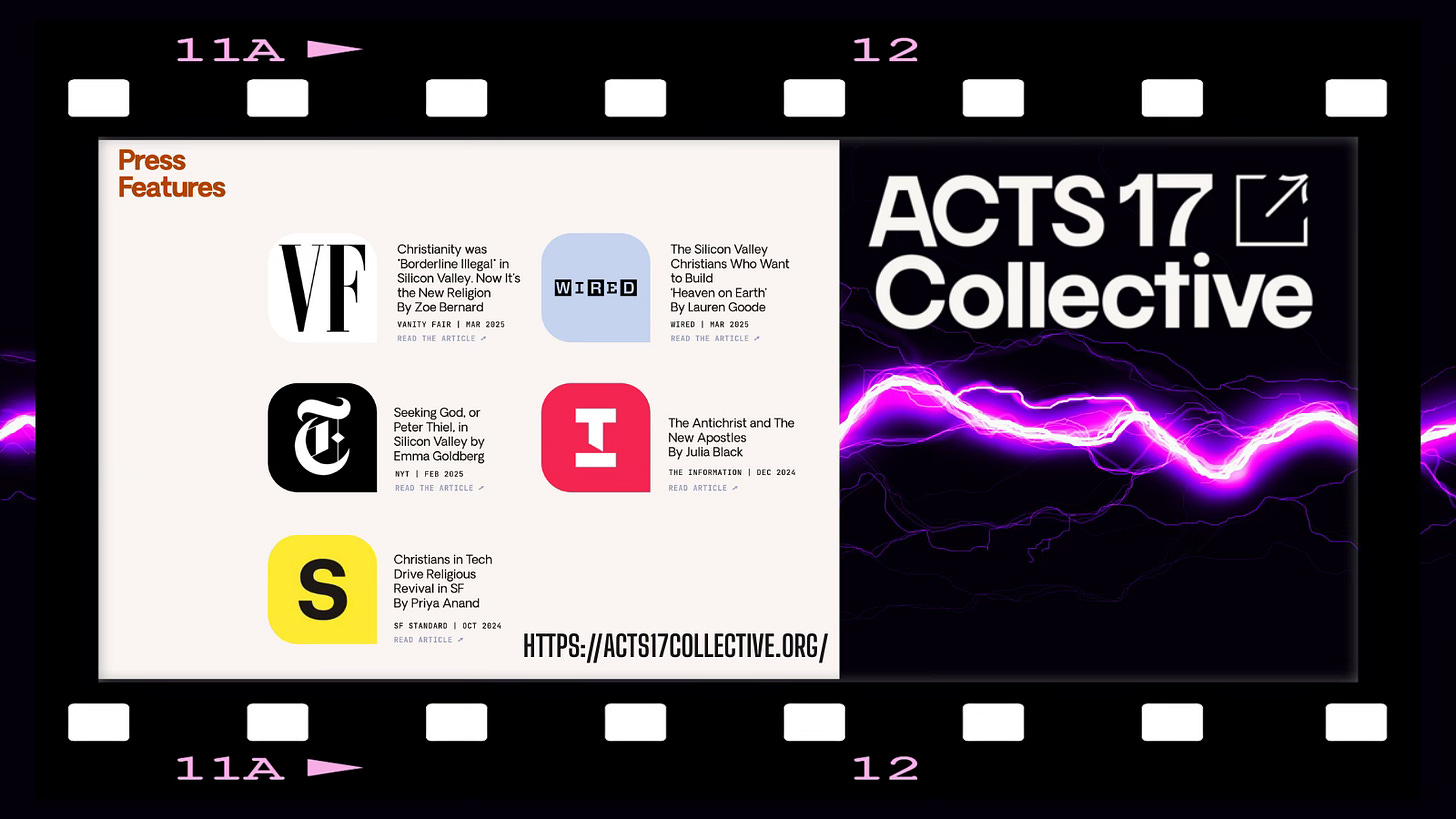Verbatim from Sam Altman’s 2013 blog post How to Be Successful:
Sam Altman
Successful people
"Successful people create companies. More successful people create countries. The most successful people create religions."
“I heard this from Qi Lu; I'm not sure what the source is. It got me thinking, though--the most successful founders do not set out to create companies. They are on a mission to create something closer to a religion, and at some point it turns out that forming a company is the easiest way to do so.
In general, the big companies don't come from pivots, and I think this is most of the reason why.”
A window into how elite technocrats think about meaning and social control
Altman is not saying they literally want to build a church with pews and hymnals. He means they want to build systems of belief that people devote themselves to, with loyalty, ritual, identity, purpose. A religion in this sense is a totalizing worldview that explains life, gives moral purpose, binds people together in community, and channels sacrifice and obedience.
Why does he say it this way?
Because the highest ambition for the elite technocrat is not to merely make money — it’s to shape civilization. And the people who shape civilizations are not just CEOs — they are the prophets and high priests of new belief systems: cults of progress, transhumanism, techno-utopianism, AI salvation, or whatever the “big sense of mission” is.
The next line — “How do we get really, really smart people to join us?” — shows the strategy:
The “sense of mission” is the bait. To recruit the best minds and keep them loyal, you must offer them meaning, transcendence, an enemy to defeat, and a future to build.
What’s the result?
The “company” is just the vessel. The real product is belief.
Think of how Apple turned customers into evangelists.
Or how Google’s “Don’t be evil” mantra created an ethical tribe.
Or how OpenAI, with “aligning humanity and AGI”, frames itself as a guardian of humanity’s future — literally an eschatological role.
When Sam Altman or similar figures talk about “building a religion,” they are signaling that the tech elite see themselves as modern priests, offering a secular salvation narrative. The company is a means of mass conversion — a structure for organizing faith around technological progress.
Peter Thiel’s Machine Gospel
Tech libertarian. Political kingmaker. Palantir’s godfather. Peter Thiel wears many crowns, but the strangest one is the cross he claims, reshaping Christianity in his image.
🧠 The Techno-Spiritual Coup
In the heart of San Francisco, a new religion is being born—not through revelation, but through rebranding. Silicon Valley’s tech elites, led by billionaires like Peter Thiel and fronted by organizations like ACTS 17 Collective and Epic Church SF, are forging a counterfeit Christianity engineered for global compatibility. The goal is not repentance and salvation, but interfaith unity, behavioral wellness, and social cohesion. This is not the gospel of Jesus Christ. It is the gospel of the Global Order.
Under the guise of revival, this movement introduces a Jesus compatible with Sustainable Development Goals (SDGs), therapeutic culture, and pluralistic values. This new Jesus doesn’t call sinners to repent but calls influencers to lead. He is not the crucified Savior who redeems from sin, but a lifestyle brand that affirms identity, hustle, and inclusion.
"The Jesus we know isn’t the Jesus of religion... He is the Jesus of the people. Honest Christianity... is a radically inclusive faith." – Michelle Stephens, ACTS 17 Collective
This is He Gets Us 2.0—a Jesus with no judgment, no cross, no exclusive claims. A spiritual icon stripped of authority and repackaged for global consumption.
📡 ACTS 17 Collective: Marketplace Ministry or Globalist Messaging Hub?
The ACTS 17 Collective presents itself as a revival of early church witness in the public square. But beneath the surface lies a strategic alignment with global governance goals. The name, referencing Paul’s Mars Hill sermon, ironically signals their real aim: to convert Christianity into a respectable, rational, pluralist-compatible worldview—fit for TED Talks, startup culture, and international diplomacy.
Their events feature Thiel speaking of a personal relationship with Jesus while simultaneously upholding frameworks of humanistic futurism and elite-led transformation. This double-speak sanitizes the gospel for polite society and aligns faith with influence, not submission to Christ.
The gospel of Silicon Valley is networked, monetized, and optimized for compliance—not conviction.
⛪ Epic Church SF: Prototype for the Post-Christian Church
Epic SF is more than a church—it’s a prototype. Combining business leadership seminars, emotional wellness initiatives, diversity commitments, and sleek branding, it functions as the religious wing of the tech revolution. Its Christianity is palatable to the city’s values: innovation, affirmation, and progress.
Rather than confronting sin or proclaiming Christ’s Lordship, Epic SF guides attendees through self-discovery, relational intelligence, and social impact. Like many churches caught in the trap of cultural relevance, it redefines sanctification as self-actualization. The cross becomes a metaphor. The resurrection becomes a vibe.
Epic SF is not a remnant; it’s a flagship. It shows the world how to do church without the offense of the gospel.
ACTS 17 + Code & Cosmos — Silicon Valley’s False Jesus Movement
“Like, how are you a smart person — and a Christian?” That jab from Michelle Stephens reveals the whole tone: Silicon Valley’s self-appointed priesthood mocking historic Christianity as primitive. As Wired notes, ACTS 17 is “Silicon Valley’s spiritual reawakening” pitched to brilliant technologists who think ordinary churches aren’t enough. The SF Standard says they are "building a new Christian identity for the Bay Area's smartest class".
This is nothing new. Proclaiming to be wise, they became fools. Like Babel, pride towers up — "We will build a name for ourselves!” — only to collapse in judgment. Code & Cosmos is ancient Gnosticism rebranded: salvation through secret knowledge for the elite. It’s Theosophy with AI ethics and narrative gaming.
Michelle Stephens and ACTS 17 aren’t just hosting tech meetups — they’re fronting a false Jesus: an interfaith, eco-tech, posthuman "Christ" customized for Silicon Valley’s cult of mind and machine. Vanity Fair — in its March 20, 2025 piece titled "God Complex: Christianity Was 'Borderline Illegal' in Silicon Valley. Now It’s the New Religion" — calls Thiel, Trae Stephens, and Garry Tan “the visible technologists shepherding this revival.”
It flatters the pride of the clever — and damns them. Because this gospel denies sin and repentance. It replaces the scandal of the cross with the flattery of cosmic intellect.
The ACTS 17 Collective presents itself as a revival of early church witness in the public square, referencing Paul’s Mars Hill sermon in Acts 17. There, Paul engaged the pagan philosophers at the Areopagus, proclaiming the one true God and the risen Christ — not compromising, but confronting false worship. Today, ACTS 17 twists this example into cultural accommodation, aligning with global governance goals under a sophisticated mask.
Pride goes before destruction. May those with ears to hear flee Silicon Valley’s false Christ and cling to the true Lord — the Way, the Truth, the Life.
🔍 Vanity Fair quote:
“Believers like Garry Tan are flipping the script in the venture capital world, making faith matter just as much as the ability to turn a fortune. Says one entrepreneur, ‘There are people that are leveraging Christianity to get closer to Peter Thiel.’”
This is an admission:
People in this Silicon Valley circle are using Christianity — not as a saving faith in the crucified and risen Christ, but as social capital. It’s a tool to network upward: to curry favor, secure deals, and get into the inner sanctum of power.
This is not a revival of the early church. This is simony — buying influence with a religious veneer. It’s exactly what Simon Magus did in Acts 8: he tried to buy the power of the Holy Spirit to increase his own prestige. Peter rebuked him sharply: “May your silver perish with you, because you thought you could obtain the gift of God with money!” (Acts 8:20).
📖 Why this exposes rotten fruit, biblically
1️⃣ True faith can’t be leveraged for worldly gain.
“You cannot serve God and money.” — Matthew 6:24
If your “faith” helps you climb a venture capital ladder to get closer to billionaire powerbrokers — it’s not faith. It’s a racket.
2️⃣ This is the opposite of what biblical shepherds do.
“Shepherd the flock of God…not for shameful gain, but eagerly.” — 1 Peter 5:2
Garry Tan, Thiel’s circle, and ACTS 17 present this movement as “revival,” but it’s an inversion: it is transactional faith — Christianity as a networking strategy.
3️⃣ It produces a false gospel that flatters human pride.
“For they loved the glory that comes from man more than the glory that comes from God.” — John 12:43
This is exactly that. The glory isn’t Christ crucified — it’s the glow of Thiel’s wealth and influence.
🔑 Bottom line:
When entrepreneurs openly admit they are leveraging Christianity to get closer to a powerful man, it exposes the entire ACTS 17 “revival” for what it really is:
A gospel of ambition, not repentance.
A fellowship of influence, not sacrifice.
A movement that uses the name of Jesus as a social ladder, not a cross to carry for the glory of God.
It’s rotten fruit — visible for anyone who knows the Word.
The true gospel produces humble, repentant, Spirit-filled believers who glorify Christ alone, not hustlers who use His name for venture capital meetings.
The SF Standard says they are "building a new Christian identity for the Bay Area's smartest class".
Below is their actual manifesto, so readers can see exactly how this false gospel markets itself:
ACTS 17 Collective Manifesto (Excerpt)
"We’re defining success for the people who define culture."
A Manifesto for the Curious, the Creators, and the Culture-Shapers
"As humans, we are all made to worship and will worship something if we don't worship God.
What are you putting your faith in? What are you worshipping?
In a world where we’re always building — startups, audiences, reputations — it’s easy to forget to ask what we’re building toward. Fame, power, money, success: these things promise fulfillment, but often leave us wanting more.
We believe there’s something deeper worth exploring.
Not just for your work, but for your soul.
Not just for Sundays, but for your every day.
Not just to fill you, but for you to find wholeness." Source: ACTS 17 Collective Manifesto
This manifesto speaks of longing and wholeness, but never of repentance or the cross. It talks about Jesus as an answer to ambition, not as the risen Lord who demands repentance and offers forgiveness through His blood alone (Acts 17:30-31). The ACTS 17 Collective invites curiosity but preaches a gospel that flatters the pride of the clever and ambitious. It promises self-fulfillment, not self-denial. It seeks to "define success for the people who define culture," instead of dying to self and proclaiming Christ crucified. This is not the gospel of Jesus, it is another gospel. And another gospel is no gospel at all (Galatians 1:6-9).
Michelle Stephens (Michele Chinn Fahey), co-founder and Executive Director of ACTS 17, describes herself as a lifelong “connector” who gathers people around purpose and beauty, branding her faith as “relationship, not religion.” She once wrote that Peter Thiel supports ACTS 17 because, as he joked over brunch, he’s “scared to say no” — a comment she proudly celebrated: “I felt so seen.” This exposes the dynamic for what it is: social leverage, not spiritual conviction. No gospel — just a vibe.
Stephens credits the idea for ACTS 17 to her husband Trae’s 40th birthday bash — a lavish, multiday event at their New Mexico home dubbed “the roast, the toast, and the holy ghost,” where guests ate breakfast pizzas, sipped mimosas, and listened to Peter Thiel preach a sermon on miracles and forgiveness.
“I didn’t even know Peter was a Christian… How can a gay billionaire be a Christian?” — Michelle Stephens
She goes on to claim there’s a “natural affinity” between tech and Christianity: people in the industry, she says, “give back” by creating jobs and wealth meant to provide abundance for all.
This sounds remarkably like the collective-speak for the “greater good” we so often hear echoed in platitudes from the World Economic Forum—an elitist narrative in which the powerful cast themselves as benevolent providers of jobs and opportunity. It flatters the ego and feeds humanity’s longing for meaning and purpose, but it is shallow, Christless, and Crossless, as we will show.
🕊️ A Spirit, But Not the Holy One
What animates this movement is not the Holy Spirit, but the spirit of the age—disguised as love, unity, and progress. It is the same spirit behind the White House Faith Office and the Religious Liberty Commission. It preaches:
Unity without truth
Identity without repentance
Hope without holiness
In this gospel, emotional healing replaces spiritual rebirth. Social justice replaces divine justice. And the kingdom of God is replaced by stakeholder-managed community transformation.
This is the religion of Babel with a Bible verse tacked on.
People, Planet, Profit is not just a catchy slogan — it’s a secular counterfeit trinity.
In biblical Christianity, the true Trinity — Father, Son, and Holy Spirit — is the divine source of life, truth, and salvation. But in globalist ESG-speak (Environmental, Social, Governance), the substitute creed is People, Planet, Profit: a pseudo-sacred triad that merges environmentalism (Planet), social engineering (People), and economic control (Profit) into a single ideological system. It’s a man-made salvation plan for the world — but without Christ.
This trinity forms a closed ideological loop.
People means social engineering — DEI mandates, Social Emotional Learning (SEL), reflexive law, and compliance culture.
Planet means sustainable development — climate governance, resource rationing, and land control.
Profit means stakeholder capitalism(sovietism) — financial carrots and sticks, ESG scores, and mass surveillance in the name of “ethical business.”
These pillars demand constant allegiance and ritual compliance. The system claims moral authority: “save the planet,” “uplift the marginalized,” “build sustainable growth.” But there is no gospel, no repentance, no grace — only endless works and behavioral control.
By design, this antichrist framework replaces the gospel of Christ with a gospel of collective works. You aren’t saved by faith — you’re judged “good” if you perform well in the planetary system. Your carbon footprint, your diversity footprint, your governance footprint — these become your new moral credentials. It’s redemption without the Cross, righteousness without repentance — a false kingdom with no Savior.
Layered onto this is Silicon Valley’s technocratic “big sense of mission” — the gospel of endless innovation and engineered moral uplift. This is the Sam Altman–style religion: a startup zeal that recasts companies as vessels for civilization-shaping belief systems. It injects children and society with an elite-designed sense of higher purpose — a therapeutic cult with the moral high ground, built to bypass guns and ballots and replace them with “wellbeing” compliance and engineered virtue.
🔥 Warning to the Church
Silicon Valley’s gospel is attractive, persuasive, and well-funded—but it is not the gospel of Jesus Christ.
It is the Gospel of Technocracy: designed to pacify dissent, absorb faith communities into behavioral systems, and neutralize the exclusive truth claims of Christianity.
The Church must hold the line. The seduction is strong. But the true gospel - offensive, exclusive, glorious - still saves.
Summer Black, Director, Armor of Truth

















